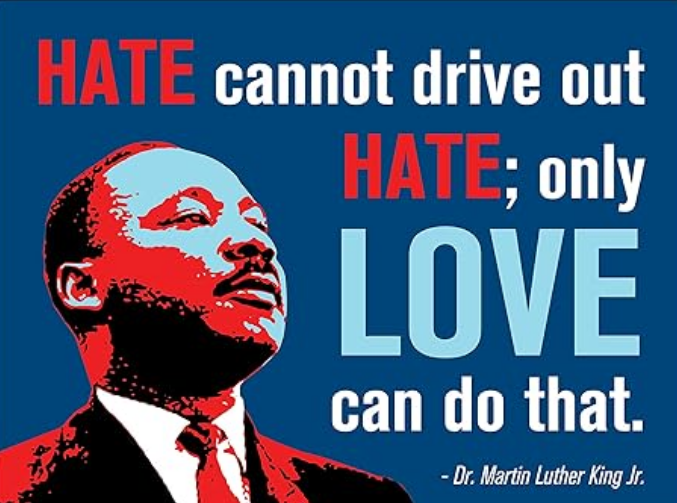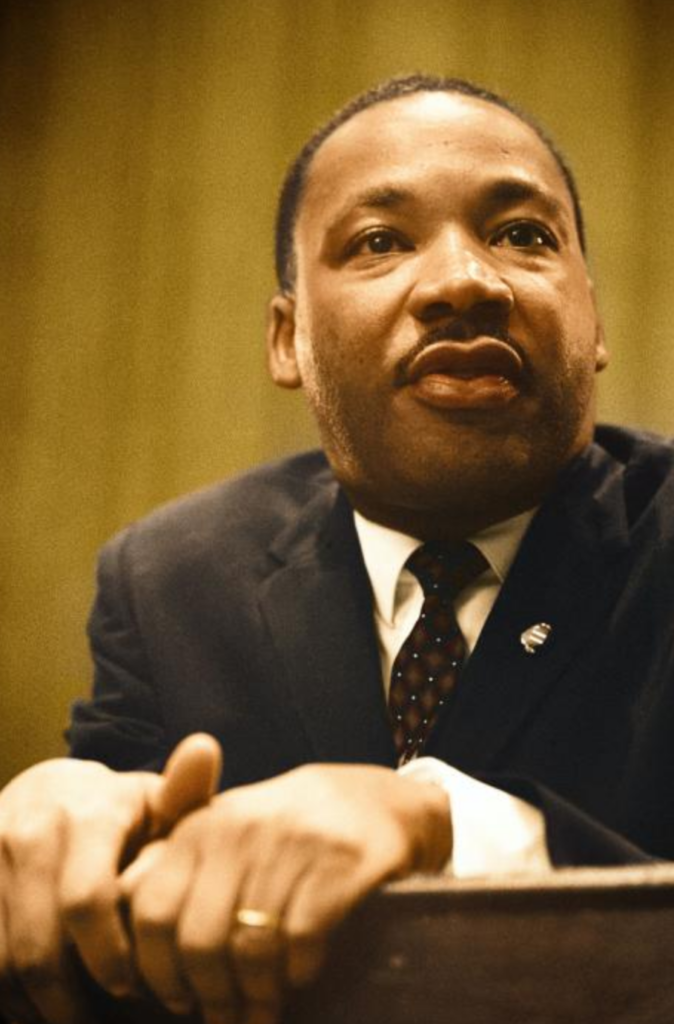First Unitarian Universalist Society Burlington
January 19, 2025
Reverend Karen G. Johnston
Dr. King is famous for many things, least of all, but nevertheless precious, is a plethora of quotes that relate to love. Perhaps the most famous of which is

What kind of love? Mushy love? Romantic love? Saccharine love? Hardly.
I have had on my mind this quote from Dr. King from his sermon delivered on April 4, 1967 in which he criticized the war in Viet Nam, practicing a growing intersectionality that had been largely absent before:
“When I speak of love I am not speaking of some sentimental and weak response. I am not speaking of that force which is just emotional bosh. I am speaking of that force which all of the great religions have seen as the supreme unifying principle of life. Love is somehow the key that unlocks the door which leads to ultimate reality.” (“A Time to Break Silence”)
Now, Dr. King makes a compelling point about the source of all faith traditions. This could be a great jumping off point for a sermon on pluralism. Instead, today’s focus is on ensuring that as Unitarian Universalists, our love at the center of our values is not “emotional bosh.”
The love at the center of our values cannot be sentimentality.
It cannot be mushy.
It cannot be All Lives Matter.
It cannot be Hallmark.
It cannot be easy. Not at this time, with a whole world on fire (not just Los Angeles) and nations all over the globe tilting towards right-wing nationalism.
It must be deeper than that. It must be more visionary than that. It must be less nice and more kind, by which I mean, boundaried alongside compassionate. Eyes on the prize. Grounded. Spiritual. Insistent. Persistent. Fierce.
Dr. King himself, in his speech “Where Do We Go From Here?” given four months after the anti-Vietnam War one, he gave more hints about what kind of love he means when he says he does not mean “emotional bosh.”
Dr. King called that love “strong [and] demanding.”
Dr. King called that love something that “must massively assert … dignity and worth.” That will “stand up amid a system that still oppresses … and develop an unassailable and majestic sense of values.”
Dr. King said “that power without love is reckless and abusive, and that love without power is sentimental and anemic.” He said that emphasizing that our philosophers were confused and outright wrong in considering power and love as polar opposites. Power need not deny love and love need not resign power.
Dr. King said that love is “a time for action.”

In the early part of my social work career, one of my all-time favorite jobs was working at a homeless shelter for adult women six blocks from our nation’s Capitol building. I was an idealistic young white woman who considered herself an anti-racist, working in a predominantly Black space – mostly Black residents, largely Black co-workers (though with a staffing hierarchy that favored white people). As case manager, I worked mostly 9-5, though once a week, there was an evening shift.
Evening shifts were shared with the overnight staff, who were often Black women who had experienced addiction and houselessness, yet had transitioned into recovery and housing stability. I remember one conversation in particular – with Yvonne and Ethel ~ in which we, two Black women and one white woman, risked talking candidly about race.
In the course of that conversation, I said that I believed it is impossible for a white person, in the midst of systemic racism, to not be racist. And this included me. I remember their surprise. Probably not that white people are racist and conveyers of systemic racism, even if we don’t support those systems. But that a white person would acknowledge this. They asked for an example of my racism.
Now, this was the early 1990s. It was the tail end of the crack epidemic, which had hit Washington DC hard. It was also a period when carjackings were a real thing and always on the news. The example I shared was that when I stopped at a traffic light, if there was a Black man standing at the light, I would check my car doors to make sure they were locked. A sure sign that I experienced the presence of a Black man as dangerous.
I remember being hesitant, even scared, to acknowledge my action was fed by a racist trope. Afraid of losing our positive working rapport, though I think I sensed there could be something more real on the other side of this conversation. Their response has stayed with me.
First, they both spontaneously said: “we do, too!”
White relief flooded throughout my body. For a moment, I felt like I was let off the hook for being racist. Since they did the same thing, maybe my actions weren’t driven by racism?
Then Ethel said, “Yeah, but you know what the difference is? We love him.”


Love matters.
The kind of love matters. It cannot be “emotional bosh.” It cannot be sentimentality. It cannot be guilt dressed up as appreciation. It cannot be white fetishization or tokenism.
Ethel and Yvonne meant something that allowed them to see a practical situation (a human is standing too close to a car door in an age when stealing vehicles at traffic lights is a real thing) AND to see the humanity in the person who just might attempt to steal their car. Not just a thief, but a person with an unmet need. Not just a potential danger, but a person, multi-dimensional, with a story and a history. Not an Other, but another human being, with whom there are shared commonalities, assumed to be present, waiting to be discovered. They could lock their car door and wish the man on the corner well out of a sense of love.
In bringing this reflection to a close, let me call you back to the words of Dr. King we used in our call to worship**, which came from that August, 1967 speech, “Where Do We Go From Here?” about the centrality of love, the necessity of love, the utter necessity of love, for if you have not love, it means nothing.
This is an invitation to love. Will we accept it?

Let us distance ourselves from emotional bosh.
Let us do the work necessary to both open to Love at the Center and to build a world which centers Love. Both/And.

** The Call to Worship:
Our call to worship today comes from lightly adapted words written and spoken by Reverend Dr. Martin Luther King, Jr:
I say to you today, my friends, that you may be able to speak with the tongues of [humans] and angels; you may have the eloquence of articulate speech; but if you have not love, it means nothing.
Yes, you may have the gift of prophecy; you may have the gift of scientific prediction and understand the behavior of molecules; you may break into the storehouse of nature and bring forth many new insights; yes, you may ascend to the heights of academic achievement so that you have all knowledge; and you may boast of your great institutions of learning and the boundless extent of your degrees; but if you have not love, all of these mean absolutely nothing.
You may even give your goods to feed the poor; you may bestow great gifts to charity; and you may tower high in philanthropy; but if you have not love, your charity means nothing.
You may even give your body to be burned and die the death of a martyr, and your spilt blood may be a symbol of honor for generations yet unborn, and thousands may praise you as one of history’s greatest heroes; but if you have not love, your blood was spilt in vain.
What I’m trying to get you to see this morning is that a [person] may be self-centered in [their] self-denial and self-righteous in [their] self-sacrifice. [Their] generosity may feed […] ego, and […] piety may feed […] pride. So without love, benevolence becomes egotism, and martyrdom becomes spiritual pride.
Here ends the quote. Here ends the sermon.